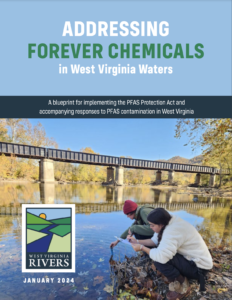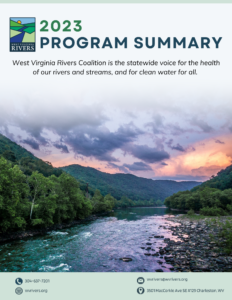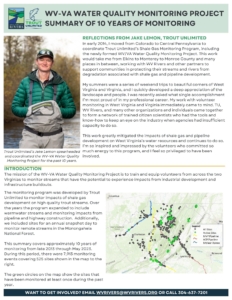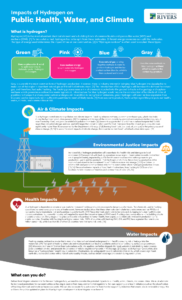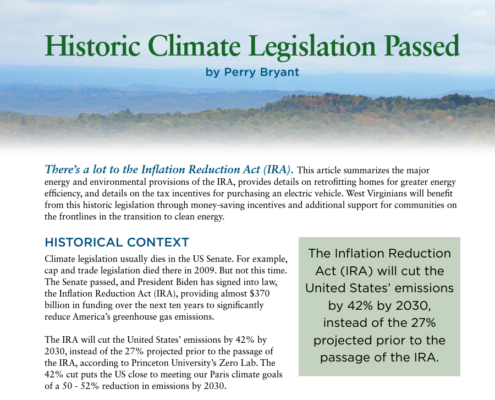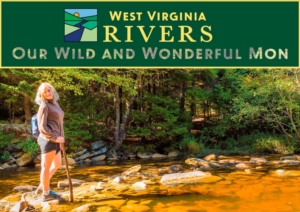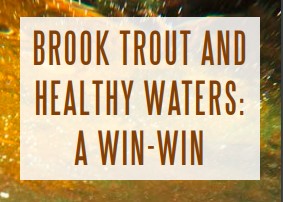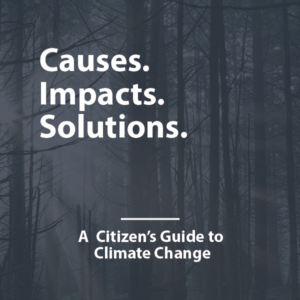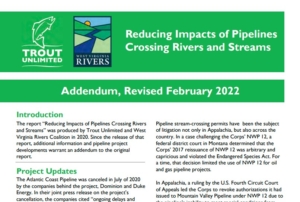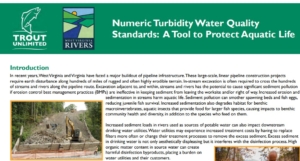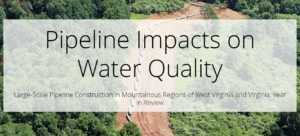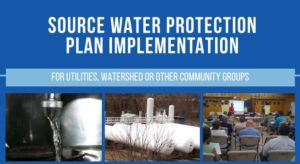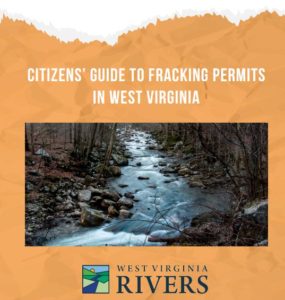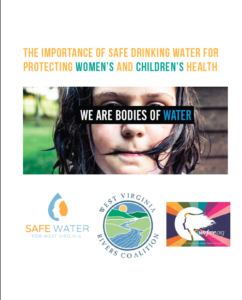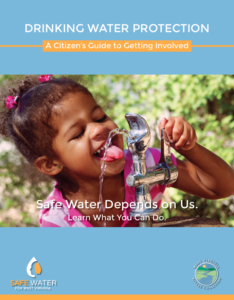MVP Stream and Wetland Report
The comprehensive analysis documents the environmental impacts of the 303-mile fracked gas pipeline on West Virginia’s stream and wetland crossings. The pipeline, spanning 11 counties and eight major watersheds, crosses thousands of streams and wetlands and critical habitats in mountainous terrain with steep slopes and highly erodible soils. The analysis evaluated data collected by independent consultants at 139 stream crossings and 61 wetland crossings. The results highlight the alarming environmental impacts of the pipeline construction. Watch the webinar.
Community Priorities for Ohio River Basin Restoration and Protection
From toxic pollution to sewage contamination and flooding, West Virginians throughout the Ohio River Basin are raising alarm bells about the state of local waters, according to a report released by the National Wildlife Federation (NWF) and the Ohio River Basin Alliance. West Virginia Rivers Coalition worked in collaboration with NWF, ORBA, and advocacy groups across the region to host community listening sessions to define priorities that will drive the Ohio River Basin Alliance’s plan to restore and protect the waters of the Ohio River Basin. ORBA aims to present a comprehensive restoration plan to the U.S. Congress later this year, advocating for federal investments to enact the plan’s recommendations.
Addressing Forever Chemicals in West Virginia Waters
The WV Rivers Coalition presents a comprehensive blueprint for addressing the persistent issue of forever chemicals in West Virginia waters. This publication outlines a strategic plan for the effective implementation of the PFAS Protection Act. With a focus on combating PFAS contamination, the coalition offers insightful responses tailored to the unique challenges faced by West Virginia. Join us in safeguarding the state’s water resources and fostering a healthier environment through informed and actionable measures.
WV Rivers 2023 Program Summary
At the core of our mission is a shared commitment to advocating for the health of our rivers and streams and ensuring clean water for all. In 2023, we’ve made significant strides in water quality advocacy, public lands protection, citizen oversight, Safe Water for WV, Ohio River Basin coalition building, and climate resilience. In addition to our program work, our team has grown significantly. As such, we have prioritized organizational development and long-term planning to ensure that WV Rivers remains a steadfast and trusted leader in the environmental space in West Virginia and throughout the Appalachian Region. We are thrilled to share our 2023 Program Summary with you now.
Review our 10-Year Report on our Water Quality Monitoring Efforts
Dive into a decade’s worth of invaluable insights and trends in water quality through the WV-VA Water Quality Monitoring Project. Our Summary of 10 Years of Monitoring shows the vital connection between our actions and the health of our waterways.
Learn about Hydrogen Energy
With increasing interest in hydrogen energy production, learn about the different methods of producing hydrogen, as well as the potential risks, with our new publication.
Summary of the Inflation Reduction Act
There’s a lot to the Inflation Reduction Act (IRA). This document summarizes the major energy and environmental provisions of the IRA, provides details on retrofitting homes for greater energy efficiency, and details on the tax incentives for purchasing an electric vehicle.
West Virginians will benefit from this historic legislation through money-saving incentives and additional support for communities on the frontlines in the transition to clean energy.
Our Wild & Wonderful Mon
This report summarizes a series of listen sessions held in the Fall 2021 on the Monongahela National Forest and provides policy recommendations to address identified concerns.
The virtual and in-person listening sessions brought together individuals and groups who use the Mon Forest for hiking, hunting, fishing, boating, and other recreation activities. Participants discussed their ideas to improve the Mon Forest. Common themes included assuring access for all abilities and communities not traditionally using public lands, enhancing trail maintenance and signage, preserving water quality, and protecting wilderness areas in the Mon from overuse.
Brook Trout and Health Waters: A Win-Win
This brochure was created in partnership with the Eastern Brook Trout Joint Venture to provide information on brook trout and their habitat. It helps landowners manage their land to support clean water and brook trout populations. Download the brochure.
WV Rivers 2021 Programming Report
In this report, we celebrate our programmatic achievements towards our
mission over the past year. Our programs are guided by our 3-year strategic plan, which was developed at the start of 2020. All of our programs hinge coalition-building, public education and citizen action. Download WV Rivers 2021 Programming Report.
A Citizen’s Guide to Climate Change
This report, A Citizen’s Guide to Climate Change, is intended for people who are concerned about climate change and want more information. It provides factual, objective information on the science of why climate change is occurring; identifies key impacts of climate change in West Virginia and across the globe; and outlines some potential solutions.
Reducing Impacts of Pipelines Crossing Rivers and Streams
Pipeline stream crossings have the potential to impact streams in multiple ways, largely through water quality and habitat impacts. Construction activities can destabilize banks and stream beds, increasing erosion and harming aquatic life by covering habitat in fine sediments and degrading water quality. Learn about these stream crossing methods and their potential consequences in our report Reducing Impacts of Pipelines Crossing Rivers and Streams.
Numeric Turbidity Water Quality Standards: A Tool to Protect Aquatic Life
WV Rivers and our water quality monitoring program partner, Trout Unlimited published a report detailing the effects pipeline construction has on turbidity in streams and the resulting impacts to aquatic life. The report investigates Virginia’s and West Virginia’s water quality standard for turbidity, and how regulatory agencies enforce the standard.
A Year of Large-Scale Pipeline Construction in Mountainous Regions of West Virginia and Virginia
2019 is a year of large-scale pipeline construction in West Virginia and Virginia. We’ve partnered with Trout Unlimited to provide reports to the public on the effects of current pipeline construction on streams and rivers – impacts that threaten critical habitat for aquatic species and clean water supplies.
View our first report as an ArcGIS Story Map here, or as a downloadable PDF here.
Source Water Protection Plan Implementation
The guide, Source Water Protection Plan Implementation, provides information to utilities and watershed groups about Source Water Protection Plans (SWPPs) and Watershed based Plans (WBPs) to encourage collaboration in areas where there is overlap between the two plans. The guide also provides approaches and recommendations for public involvement in the implementation of both types of plans. Case studies of watersheds with both SWPPs and WBPs are included to highlight similarities and opportunities for collaboration.
Citizens’ Guide to Fracking Permits in West Virginia
Are you confused by the complicated permitting process required for shale gas development and it’s related infrastructure? Between well pad construction, hydraulic fracturing (fracking) and the pipelines needed to transport the fracked gas, there are multiple permits companies must receive from the West Virginia Department of Environmental Protection (WVDEP) before construction can begin.
That’s why we’ve created the Citizens’ Guide to Fracking Permits in West Virginia. It will help you understand and get involved in the permitting process.
Importance of Safe Drinking Water for Protecting Women’s and Children’s Health
Published in partnership with WV FREE and Downstream Strategies, The Importance of Safe Drinking Water for Protecting Women’s and Children’s Health details some of the dangerous toxins Category A protects us from and why removal of Category A is a bad idea. Read it here.
Citizens Guide to Getting Involved in SWPP
With Downstream Strategies we’ve developed a toolkit, Drinking Water Protection: A Citizen’s Guide to Getting Involved, to educate community stakeholders and prepare them to take on a leadership role in source water protection planning. Wherever you live, and wherever your water comes from, the guide will help visualize our drinking water supplies and the role of people and utilities in keeping it safe.
Guidance for Monitoring Effects of Gas Pipeline Development on Surface Water and Groundwater Supplies
This report provides information concerning risks, potential impacts, and other water supply issues related to pipeline development. It details methods for establishing baseline information on water quantity and quality, long-term monitoring to detect change, collection of data that will be needed to hold pipeline developers responsible for harm to water supplies, as well as laboratories and consultants that can conduct monitoring and perform analyses. Download it here.



